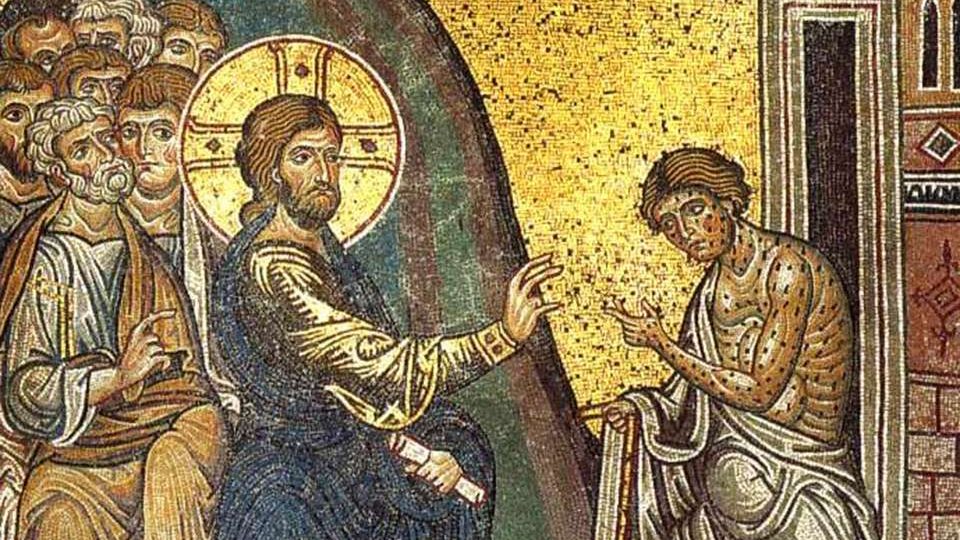Healing the Disease of Sin
6th Sunday in Ordinary Time (Year B)
“If you wish, you can make me clean.”
Mk 1:40
Leprosy is horrible. It’s deadly, highly contagious, and in the ancient world there was not really much that could be done to treat it. So all the restrictions that were put in place to keep those with leprosy separated from society made sense. It wasn’t done to punish the lepers, but to protect the community.
Be that as it may, the effect such ostracization had on the lepers was pretty awful. Think about it. You are already suffering from a debilitating and painful disease. Now on top of that, you are robbed of the comfort of family and friends. And since religious worship is a public, communal activity, you are even cut off from that.
This is an often overlooked aspect of the Jewish regulations regarding lepers. Lepers were not merely cut off from the community, they were also cut off from the temple, and so could not participate in the worship of God.
The effects of leprosy on a person can therefore be said to be threefold. It separated you from God; it separated you from the community; and it even separated you from yourself, as it seemed as though your own body was attacking you. For this reason, leprosy has been seen as a metaphor for sin. While there are obvious differences (we choose sin, but we don’t choose disease), the effects sin have on a person are remarkably similar. Sin damages our relationship with God, with the community, and with ourselves.
We see this on display in the Garden of Eden. After Adam and Eve disobey God, they attempt to hide from God, in shame for their disobedience (Gen 3:8). They hide their bodies from one another by covering them with fig leaves, because they can no longer look at one another without shame (Gen 3:7). Sin even makes them hide from themselves, when they refuse to acknowledge their own fault (Gen 3:12-13).
The effects of sin in our lives can be seen in our discord with God’s will, leading to loss of grace; our discord within society leading to hatred and violence; and our discord within ourselves leading to dissatisfaction and selfishness.
To give just one concrete example, consider the effect of pornography. It may seem innocent enough, because it is “private” and “doesn’t hurt anyone.” But no sin is ever truly private because of how it effects our ability to relate to others. Pornography trains our minds to view other people as objects for our gratification. It gives us a false view of human sexuality, hampering our ability to form meaningful romantic relationships. Long term pornography use leads to sexual dissatisfaction because of the way it trains our minds to think about sex. It’s addictive nature makes it difficult to quit, even once we realize how harmful it is. As St. Paul writes, “I do not do the good that I want, but I do the evil I do not want” (Rom 7:19). And since this kind of activity goes against the loving nature of God, it removes us from His grace.
This is but one example, but all sin functions in a similar way. Like leprosy, sin harms our relationship with God, with others, and with ourselves.
Christ’s healing of the leper in this Sunday’s gospel is symbolic of the greater healing He offers us of our sin. Sin harms relationships; Christ heals relationships. First and foremost, He restores our relationship with God the Father through the forgiveness of sin. But He doesn’t stop there. The forgiveness we find in Christ restores our relationship with the community of the Church (this is why we confess our sins to a priest, who represents not only Jesus, but the Church). And Christ’s forgiveness begins the healing process we need to be reconciled within ourselves, as well.
This inner personal healing that we need to fully recover from sin can take time, just like the physical scars of leprosy take time to heal. We may need the help of counselors, therapists, and spiritual direction along the way. But it all starts with the sacrament of confession and the healing medicine of the Eucharist.
This is the complete healing and restoration Christ desires for all of us; and He can do it. He can make you clean.
If it’s been a while since you’ve been to confession, do not fear! Here is a pdf of a short guide prepared by the US Bishops for those who are returning to the sacrament after some time.
Confessions are offered in our chapel every Sunday at 3:30 (before Mass) or by appointment.

